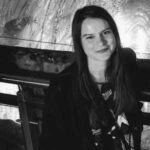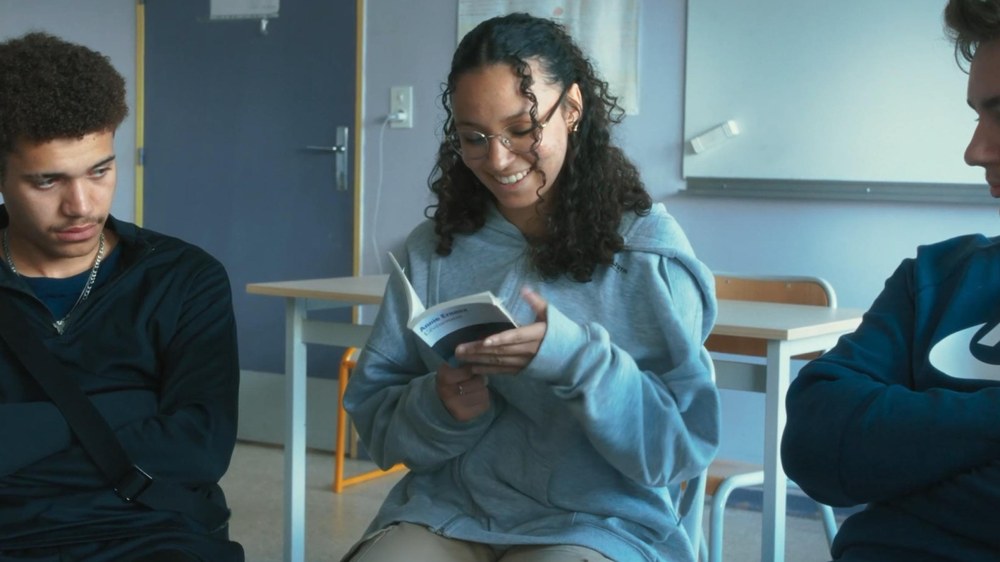Writing Life: Annie Ernaux Through the Eyes of High School Students
Writing Life: Annie Ernaux Through the Eyes of High School Students
VERDICT: French Nobel winner Annie Ernaux’s writing becomes a prism for the minds of a new generation in Claire Simon’s deceptively simple, insightful and expansive doc.
Celebrated French filmmaker Claire Simon avoids the conventional biopic route entirely in her documentary that has 2022’s winner of the Nobel Prize for Literature, Annie Ernaux, at its heart. Writing Life: Annie Ernaux Through the Eyes of High School Students instead focuses on the French writer’s books as a prism for a portrait of pupils in France and French Guiana. As they discuss her work in class, they reflect on their own experiences in intensely personal and thoughtful conversations. Writing Life feels like a smallish film for Simon, but its joy lies in her unerring ability to capture moments that hold the key to so much beyond a room’s walls.
The premise of this documentary is simple, and on the surface may seem overly specific, but it is anything but when infused with the sensitive and contagious curiosity of Simon. In a career spanning more than four decades, she has, in the manner of American director Frederick Wiseman, often been drawn to the richness of interactions within institutions as microcosms of wider society, and in documentaries such as The Graduation (2016) and Elementary (2024) tapped into the humanity that plays out within the social space of the education system, revealing dynamics of race, class, and gender that shape students, the vividness and sheer force of life of unique personalities, and both the power and limits of self-determination.
Ernaux, who reached Nobel stature from working class beginnings in Normandy and is known for unvarnished accounts of personal history and collective memory that are not inhibited by shame and sometimes shocking in their candid details, proves to be a remarkable prompt for students to consider their own origins, and the degree to which they feel pressured by social norms that dictate that parts of themselves are unpalatable and necessary to repress. Ernaux’s unromantic approach of “flat writing,” descriptions more factual than overloaded with meaning, allows them space to make their own judgments, as they consider the texts in the light of their own pasts. Simon visits a number of schools across Paris, the provinces and Cayenne, ensuring a diversity of voices, and that the colonial agenda in France’s educational system is not effaced. Modes of expression in creole languages also become part of the discussion of belonging, communication and self-censorship.
Pupils read at times sexually frank passages aloud from various assigned Ernaux books, in which she describes a clandestine abortion she had in France in the 1960s, her obsessive affair with a younger man, and the increasing gulf of understanding between herself and her parents as her academic horizons expanded and her way of seeing the world diverged. The brutal, clinical honesty with which Ernaux shares her taboo thoughts and feelings provokes a range of class reactions and discussions around sexual consent, self-worth, freedom and dignity. Challenging the comfort zone of the teenagers and led by teachers from a feminist angle, these exchanges connect with a thematic thread of women’s ownership of their own bodies and experiences that runs through Simon’s own cinema, including her recent, much-discussed Our Body (2023), shot within a gynecological clinic in Paris, as women’s bodies come up against the medical system.
In Writing Life, Simon takes her camera and intimate, close-in way of filming out of the classrooms to bus stops and other gathering spots where the students continue their personal and communal engagement with Ernaux’s work, ensuring the film never feels hemmed in or stuffily scholastic. Rather, what emerges is a vibrant and alive reminder, in a world increasingly unseduced by the printed page, of how seamlessly the artistic expression of honest and renegade thinkers complements life, and is able to nourish young minds in an active and constantly transformative manner as they find their own way in society and in a France with a powerful, ages-old establishment all too eager to mould a population into a certain prescribed image.
Director, Screenwriter, Cinematographer: Claire Simon
Producer: Emmanuel Perreau
Editor: Luc Forveille
Sound: Jules Jasko, Nathalie Vidal, Clément Claude, Pierre Bompy
Production company: Rosebud Productions (France)
Sales: Be For Films
Venue: DOK Leipzig (Opening Film)
In French
90 minutes


